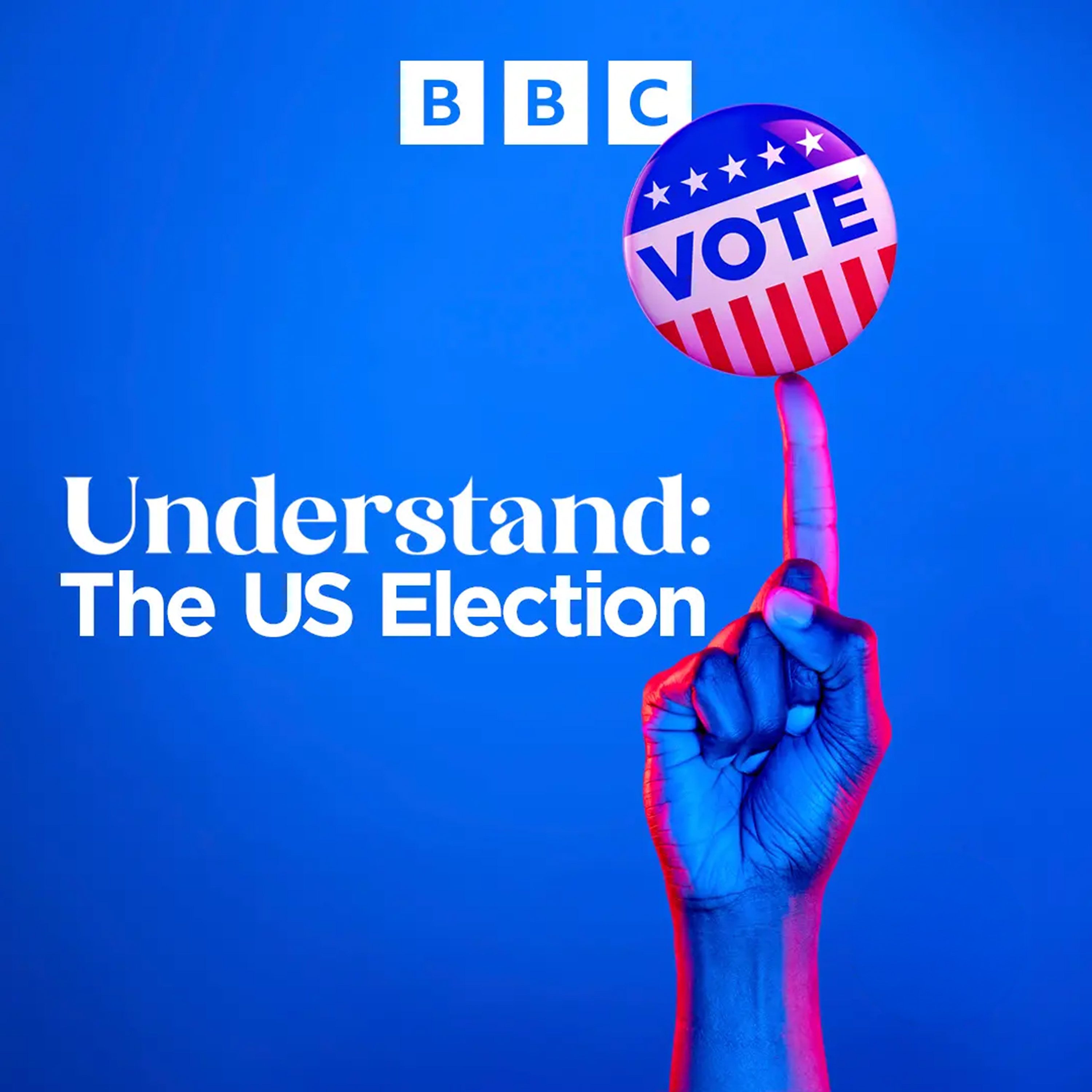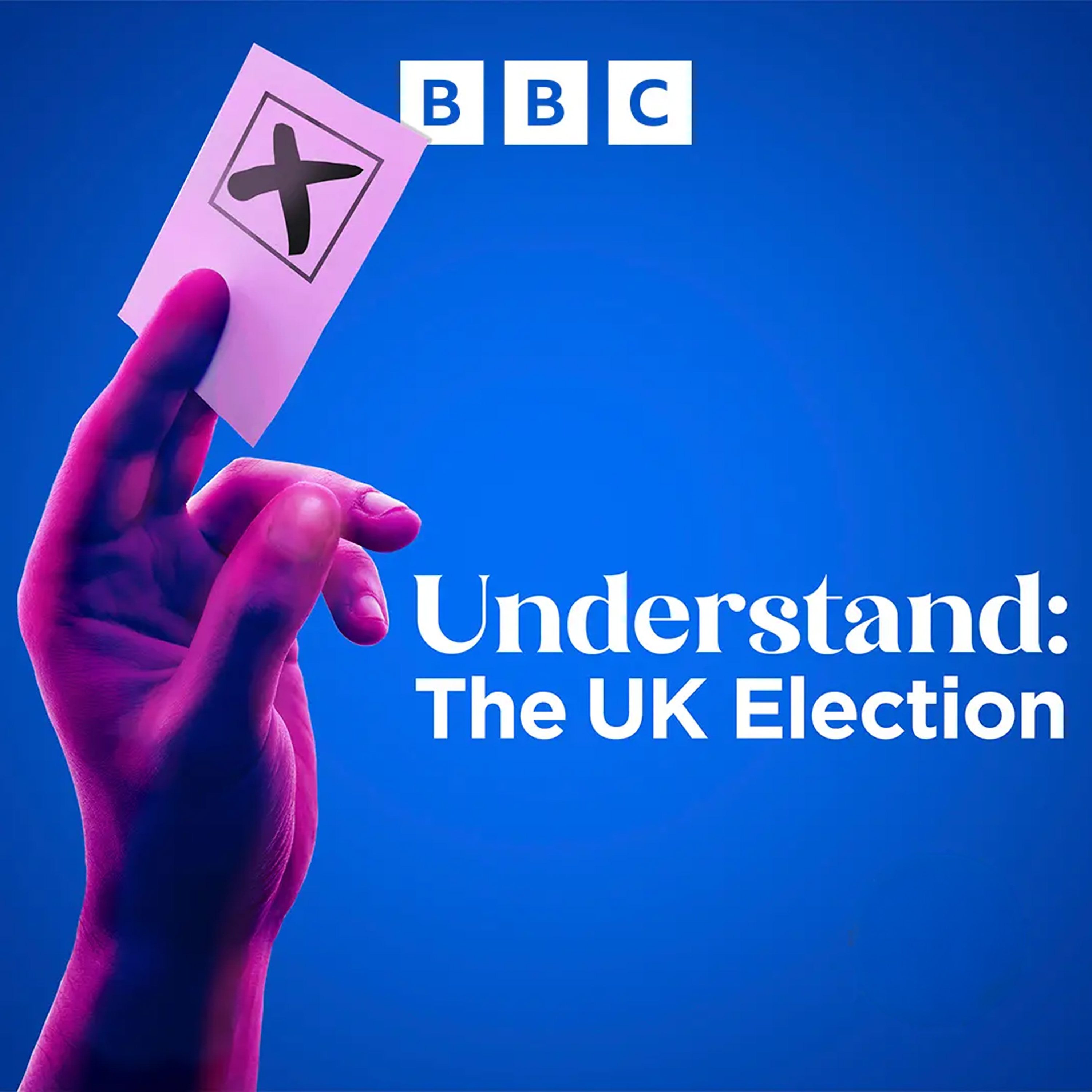The US Election: 1. Primaries, Caucuses and the National Conventions
Justin Webb, former BBC US correspondent and co-presenter of Americast unpicks some of the terminology associated with the US Election.
Press play and read along
Transcript
Speaker 1 This BBC podcast is supported by ads outside the UK.
Speaker 2 Want to stop engine problems before they start? Pick up a can of CFOAM motor treatment. C-Foam helps engines start easier, run smoother, and last longer.
Speaker 2 Trusted by millions every day, C-Foam is safe and easy to use in any engine. Just pour it in your fuel tank.
Speaker 2 Make the proven choice with C Foam.
Speaker 2 Available everywhere. Automotive products are sold.
Speaker 2 Seafoam!
Speaker 3 Booking a trip? Don't skip the travel insurance part. Insure My Trip makes it super easy to compare plans that actually fit your trip.
Speaker 3 Whether it's a weekend getaway or a semester abroad, we've got you covered.
Speaker 3
From cancellations to lost luggage and medical emergencies, no shady providers, just smart tech and real help from licensed agents. Plus, we don't play favorites.
Just what's best for you.
Speaker 3
Be the main character when you travel. Protect your trip at InsureMyTrip.com.
That's insuremytrip.com.
Speaker 3 BBC Sounds, music, radio, podcasts.
Speaker 1 Hello and welcome to Understand the U.S. Election.
Speaker 1 My guests and I will bring you a user's guide to how the next American president will be chosen, from how the candidates are selected to what happens on the campaign trail on election night and the rules for the inauguration as well.
Speaker 1
And we'll have a few lessons from history along the way. I'm Justin Webb, one of the hosts of Americast, our BBC Sounds podcast on all things American.
I lived in the US for the best part of a decade.
Speaker 1 I was the BBC's first North America editor. I have a child born there too, a US citizen by birth, which gives me an added connection to the place.
Speaker 1
Today we are talking about how the candidates are picked. And to help me out, one of my fabulous AmeriCast co-hosts is here with me, Sarah Smith, the current North America editor.
Howdy, Sarah.
Speaker 4 Hey there.
Speaker 1 And my other guest today, Ned Foley, Director of the Election Law Program at Ohio State University. Ned, hello.
Speaker 5 Yes, good to be with you.
Speaker 1
Well, thank you very much for joining us. Let's start right at the beginning.
Who can run for president?
Speaker 5 Well, the basics are that you have to be 35 years old and have to be born a United States citizen, and you can't have been president twice before.
Speaker 5 But then this year, the extra wrinkle is the former President Trump's role in the insurrection on January 6th, whether that could affect his candidacy this year.
Speaker 1 Yeah, it is more complicated this year, Sarah, isn't it?
Speaker 4 Yes, there have been legal challenges about whether or not Donald Trump can run because there is a clause in the Constitution that says any officer of state who has engaged in insurrection or rebellion is disqualified from running for president, but that is being adjudicated through the courts where it's possible that that clause doesn't apply to somebody who did that whilst they were president of the United States.
Speaker 4 There are other things as well which may come up with Donald Trump.
Speaker 4 If he is convicted of a felony in any of the court cases that he's facing next year, that won't stop him running for president because felons have run before, in fact, but they've never won the presidency.
Speaker 4 Which leads us to a possible wrinkle. What would happen if Donald Trump had been convicted and sentenced to jail before the election?
Speaker 4 Could he be sworn in as President of the United States from a prison? Now, it's pretty unlikely that the legal process will have got to that place by then, but it's possible.
Speaker 1 Okay, let's get back to certainties. The American electoral system, dominated, of course, by the two main parties.
Speaker 1 The Democrats, broadly left-leaning, the party of Joe Biden, of course, and their colour is blue. The Republicans, known as the GOP, broadly right-leaning, their colour is red.
Speaker 1
Traditionally, voters ending up with a choice between the nominees of those two parties. So here is my question, Ned.
How do the parties select their candidates?
Speaker 1 We've got caucuses, we've got primaries, and then we've got the national conventions. So if we break it down, can we start with the primaries? What are they? How do they work?
Speaker 5 Sure. And as you say, it's sort of a complicated process.
Speaker 5 Primaries are preliminary elections run by the state governments and allow the voters of each state one by one to participate in the process that leads to selection of delegates who then go to the party's conventions.
Speaker 5 So New Hampshire is the state with the first primary traditionally, and that's true again this time. And then there'll be a series of primaries throughout the first months of the year.
Speaker 1 And what about caucuses?
Speaker 5 So they're run exclusively by the parties themselves. They also result in picking delegates to go to the convention.
Speaker 5 But the difference is a caucus is a party meeting where citizens have to show up, usually in the evening and gather in a living room or in a gymnasium or somewhere to select delegates, whereas a primary looks like a traditional election with ballots and voters go to the polls.
Speaker 1 And generally, who does show up? I mean, who takes part in these primaries and caucuses?
Speaker 5
Well, the rules vary state by state. The rules are determined by state law.
All 50 states get to decide for themselves.
Speaker 5 And then the parties also have a rule since it's their conventions that the delegates are chosen for. But in general, it's voters who align themselves with each party will vote in the party's primary.
Speaker 5 And turnout depends on the level of enthusiasm for that party in that state.
Speaker 1
Right. And the primaries start sequentially.
And then a thing happens, Sarah, called Super Tuesday. Take us through that.
Speaker 4 Yes. And it is early this year, March the 5th, 2024 will be Super Tuesday.
Speaker 4 And that's when a huge number of states all have their primaries, 15 in all, including some of the biggest states, California, Texas, along with Tennessee, Oklahoma, Massachusetts, Maine, Alaska, Alabama.
Speaker 4 Lots of them all vote on that day. It's not always decisive that a candidate will emerge victorious from Super Tuesday, but so many delegates are selected from these larger states that day.
Speaker 4 That's often the point at which you either declare a winner or it's obvious who is far, far ahead.
Speaker 1 Right. And take us on then to what happens to those delegates, because because they go to a party convention, don't they, later in the year.
Speaker 1 What happens there? What's the formal process there?
Speaker 4 So the delegates who have been selected from these states all hold up their banners and vote for different candidates. So the outcome is a foregone conclusion.
Speaker 4 Everybody knows how many delegates are going to support the different candidates. Everybody knows who the winner is going to be.
Speaker 4 But there is actually a roll call vote and they all stick their their placards up in the air and lodge those votes for their different candidates.
Speaker 1 And are there differences between the Republican and the Democrat way of choosing that final candidate, coming up with that person?
Speaker 5 So the rules are determined by the party, and the rules are a little bit different depending upon how the votes in the primaries get translated into delegates.
Speaker 5 So Republicans tend to use what's called winner-take-all.
Speaker 5 It's a little more complicated than that, but that's the basic idea, meaning that whichever candidate wins the entire state gets all the delegates from that state.
Speaker 5 Whereas the Democrats do it more proportionally, where they award delegates to the convention reflecting the vote shares of the several candidates.
Speaker 5 That's less of an issue this year, given that President Biden doesn't have much opposition, but that's the way Democrats traditionally do it.
Speaker 1
Okay. Let's take a dive into the history now of the process, because Ned, we've been referring rightly to the two main parties.
They will provide this year, again,
Speaker 1
the eventual candidates, one of whom will be president. There's no real doubt about that.
But we haven't talked about independence.
Speaker 1 Give us an example, if you can, of a presidential race where a third person from outside those parties hasn't won, but has caused a significant difference potentially to the result.
Speaker 5
Yeah, absolutely. Some people may remember the 2000 election.
That was Bush versus Gore went to the U.S. Supreme Court.
But just as important was Ralph Nader, a third candidate on the ballot.
Speaker 5 And he was a consumer activist and environmentalist. And he pulled votes away from the Democrat Al Gore, because he ran to Gore's left, if you will, on those topics.
Speaker 6 Thank you.
Speaker 6 It's time to go beyond rhetoric, which the two parties are very good at, especially the Democratic Party.
Speaker 6 The phony phrases of compassionate conservatism, the phony phrases of Al Gore when he says, I'll fight for you, not for the powerful.
Speaker 6 It's time to go beyond that, roll up our sleeves, and mobilize a movement that tells them what to do.
Speaker 5 Most observers think that if Nader had not been involved, Gore would have won the state of Florida and then won the entire presidency.
Speaker 5 So that's the most recent example of a really significant third party playing what's sometimes called a spoiler role. Even more important was back in the 19th century before the Civil War.
Speaker 5 This is the election of 1844, which most Americans don't learn about in history, but was hugely consequential because the issue then was the fight over slavery.
Speaker 5 And the anti-slavery coalition was split into two factions.
Speaker 5 The dominant faction wanted a more gradual elimination of slavery, but there was a smaller faction that there was the purists who wanted immediate abolition.
Speaker 5 And because they split between their two candidates, the pro-slavery candidate actually won and then began to expand America westward with more and more slave states joining the country, which ultimately caused the Civil War.
Speaker 1 Ned, what are the chances that now in 2024, a third-party candidate or perhaps more than one third-party candidate or individual candidate standing for the presidency will make a difference to the outcome?
Speaker 5 Yeah, this is a significant risk because, again, it happens on a state-by-state basis the way the presidential system works.
Speaker 5 So it only has to happen in one or more states the way Ralph Nader was a factor in Florida. You know, this year, there are several third-party candidates already mentioned.
Speaker 5 One is Robert Kennedy Jr., who's the son of a prominent American politician, former Attorney General, Robert Kennedy, whose brother, John Kennedy, was president of the United States, so famous American family.
Speaker 5
He's quite controversial, actually, because he's been associated with the anti-vax movement. So it's unclear whether he's going to hurt Trump more than Biden or vice versa.
So he's a wildcard.
Speaker 5 Then there's a professor named Cornell West, who's a political activist, who has said he's going to run as an independent, and he could pull votes from the left.
Speaker 5 If the left wing of the Democratic Party gets upset with Biden over Israel or something else, Cornell West could be a factor.
Speaker 5 And then the biggest possibility here is something called the no labels movement, which is trying to come up with a third party kind of in the the middle of American politics.
Speaker 5 They're looking at people like Senator Joe Manchin, former Maryland governor Larry Hogan, Liz Cheney, the anti-Trump Republican who people may know has talked about the idea of a third party candidate.
Speaker 5 So there's a lot of possibility out there for a third person affecting the race.
Speaker 1 What possibility, Sarah, is there that the two main parties, the Democrats and the Republicans, do not choose the people who at the moment they seem likely to choose. So Joe Biden is running again.
Speaker 1
Donald Trump is way ahead in the Republican race to be their nominee. But we haven't had votes cast.
People haven't attended the caucuses yet, the primaries, etc.
Speaker 1 What are the chances that something will happen? that throws all of that into
Speaker 1 doubt again?
Speaker 4 It's pretty unlikely that anybody will take the Democratic nomination away from Joe Biden, assuming he carries on with his campaign, because
Speaker 4 the only challenge that there is has very, very little support. And by convention, a sitting president very rarely faces a serious challenge from within his own party.
Speaker 4 There is a really competitive race going on within the Republican Party. Polls tell us that Donald Trump is way, way, way ahead.
Speaker 4 In fact, at the moment, he has more support from Republicans than all the other candidates. candidates put together.
Speaker 4 So if those polls are correct, it seems it would be extremely difficult for somebody else else to catch up with him. But anything can happen during the course of election campaigns.
Speaker 4 And as you say, not one single vote has been cast yet. So we wait for the electorate to come up with their decision.
Speaker 1 And Ned, if Joe Biden were to decide, for one reason or another, not to carry on,
Speaker 1 what would happen then? How late can he leave it?
Speaker 5 Well, it would be very, very messy, but it's happened before in different ways. In 1968, incumbent Lyndon Johnson decided very late to leave the race, and it went to a convention fight again in 1968.
Speaker 5 The rules are different. It makes it harder now for the delegates at the convention to dislodge their nominee the way Sarah was talking about.
Speaker 5 But if Joe Biden had to step aside for health reasons or whatever other reasons, there are party rules that allow the delegates at the convention to come up with a new nominee.
Speaker 1
That's it. We're out of time.
Hopefully, we're out of time. All understanding better, though, how a presidential candidate is chosen in the American system.
Speaker 1
Ned Foley, thank you so much for joining us. Thanks for having me.
And Sarah, too.
Speaker 4 Well, it's a pleasure.
Speaker 1
And remember, if you want to keep up to date with everything going on during the 2024 elections, listen to Americast. It's available weekly on BBC Sounds.
The next episode of Understand the U.S.
Speaker 1 Election will be all about the campaign trail. See you all later.
Speaker 7 From BBC Radio 4.
Speaker 7 Life can be unexpected.
Speaker 1 It was big.
Speaker 1 This was not a wind. This was not a storm.
Speaker 7 This was a tsunami. But when confronted with change, humans are remarkably resilient.
Speaker 8 I knew in that moment as I fell to the ground that I would recover more.
Speaker 7 I'm Dr. Sian Williams, psychologist and presenter of Life Changing, the program that speaks to people whose worlds have been flipped upside down and transformed in a moment.
Speaker 9 If I had to live my life again, would I ever want to go through what I went through? There's a very simple answer to that. I would go through it again.
Speaker 7 Subscribe to Life Changing on BBC Sounds.
Speaker 10
Sucks! The new musical has made Tony award-winning history on Broadway. We demand to be home! Winner, best score.
We demand to be seen. Winner, best book.
We the man to be quality.
Speaker 10 It's a theatrical masterpiece that's thrilling, inspiring, dazzlingly entertaining, and unquestionably the most emotionally stirring musical this season.
Speaker 3 Suffs!
Speaker 10 Playing the Orpheum Theater October 22nd through November 9th. Tickets at Broadway SF.com.
Speaker 3 So what do this animal
Speaker 3 and this animal
Speaker 3 and this animal
Speaker 3 have in common? They all live on an organic valley farm.
Speaker 3 Organic valley dairy comes from small organic family farms that protect the land and the plants and animals that live on it from toxic pesticides, which leads to a thriving ecosystem and delicious, nutritious milk and cheese.
Speaker 3 Learn more at OV.coop and taste the difference.


